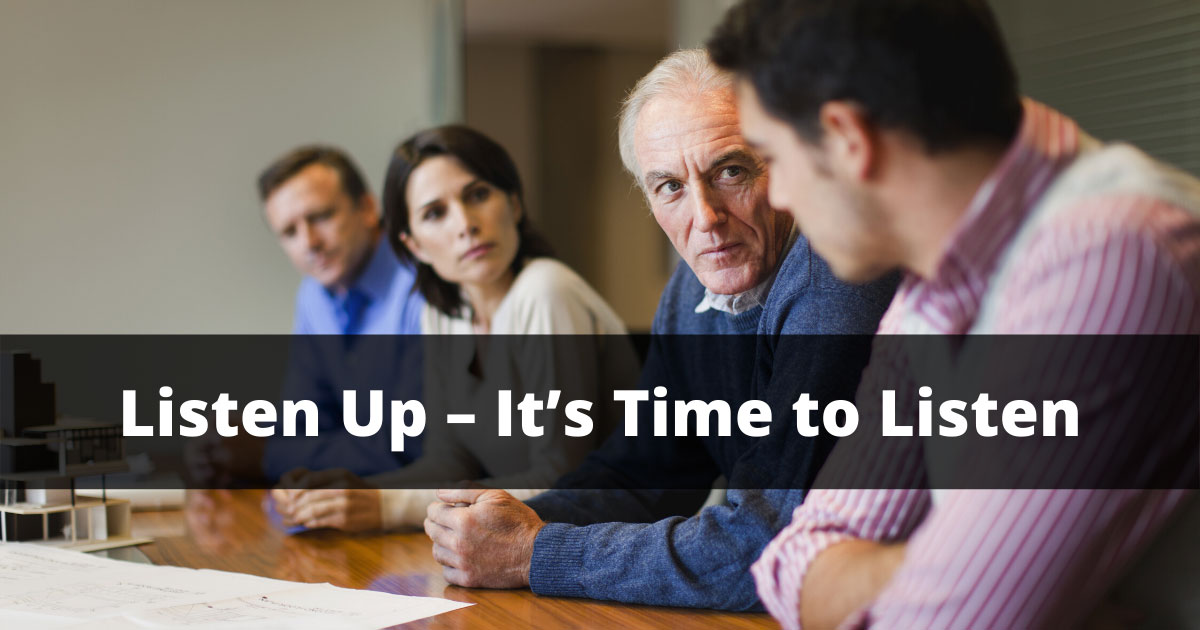Resources > Blog > Listen Up – It’s Time to Listen

In my practice as a workplace mediator, I see two common trends that are getting in the way of successful conflict resolution – first, individuals are not discussing their concerns with each other soon enough; and second, individuals often struggle in discussing conflict in a way that makes situations better, not worse.
Both trends can be overcome by: (1) increasing awareness about them and their adverse impact on workplace culture; (2) making an individual and organizational commitment to improving working relationships; and (3) giving individuals the necessary tools to effectively communicate and resolve disagreements with those around them.
Trend One: Lack of Timely and Direct Discussions
Individuals are not having direct conversations with each other soon enough. This delay seems rooted in a “conflict-avoidant” culture that exists in many workplaces (and in our society generally). Unfortunately, conflict avoidance does not mean that we successfully avoid conflict – it simply means that we avoid discussing and addressing the conflicts that exist. Avoidance doesn’t cause conflicts to disappear – it simply allows the disagreements and misunderstandings between individuals to fester and worsen over time.
Given the tendency to “avoid conflict”, individuals often wait until some “big” event has happened or they have broken down from the day-to-day dysfunction and have “had enough”.
Only then, do they meet to discuss their concerns. By this time, a significant amount of time has passed. During this time, people have collected and stored many unchecked assumptions, stories and theories in their heads about the “other person”, many of which are missing critical information and do not accurately reflect what actually happened.
On the basis of these unchecked assumptions, individuals arrive at conclusions about the motivations or agendas attached to others’ decisions/actions, many of which are also not true.
Trend Two: Lack of Mutually Respectful Dialogue
When individuals finally get together to discuss “what happened” (from their perspective), they aren’t well-practiced in sharing their perspective in a way that “lands well” with others. They do not take the time (nor have they been taught how) to moderate their own emotional reactions and eliminate hurtful labels/diagnoses of others when describing their experiences. This causes them to come across as “attacking” others instead of simply speaking with them.
At the same time, individuals on the “receiving end” of others’ feedback/concerns struggle with being able to effectively and calmly listen to and consider the information being offered (even when it has been delivered clearly and respectfully). Instead, they often react defensively (that is, they shut down and go silent or literally walk away) and/or aggressively (by interrupting, talking-over the other person or dismissing them verbally or non-verbally (by sighing, rolling their eyes, grimacing, etc.).
While there have been many articles on how to deliver our message more effectively, there has been relatively little emphasis placed on the importance of respectfully listening to others. Listening to others in an open and measured manner is fundamental to developing and maintaining sustainable and respectful relationships. In the attached article, the author points out that individuals will only feel included and connected to others once we “put aside our preconceived notions, quell knee-jerk reactions, and truly listen to and appreciate diverse viewpoints”.
This does not mean that individuals have to agree with each other in order to be “respectful” – it simply means that they have to listen to each other in order to better understand where each person may be coming from (and why).
The authors rightly acknowledge that genuine listening can often be very challenging, especially when others challenge or disagree with us on matters about which we deeply care.
Some tangible ways to enhance listening skills in order to build meaningful connections and reduce dysfunction on your team include the following:
- Allow active participation in dialogue without favoritism (we tend to allow those who agree with us to speak unchecked while we may tend to cut-off, limit, dismiss or interrupt those with whom we disagree);
- Allow for different types of “dialogue”, recognizing that some individuals may prefer to provide input in a 1:1 manner or through some avenue other than group discussions; and
- Ensure individuals truly feel “safe” to speak up without fear of embarrassment or retaliation (it is important that leaders ask individuals what it will take for them to feel this way).
While early and direct discussions are essential to building a culture of respect, those alone will not be enough to resolve conflict in an effective manner. Please “hear me out” – learning to genuinely listen, receive feedback and discuss complicated and challenging issues in an open, non-defensive and professional manner is a necessary tool in your team’s communication toolbox.
Thanks for listening.
To learn more about my effective communication workshops click the links below:
Course for Leaders & Course for Everyone
Article: Changing the Way You Listen Will Change Your Life by Susan Steinbrecher
Order your copy of “Walking On Eggshells?”
LEARN MORE ABOUT:
